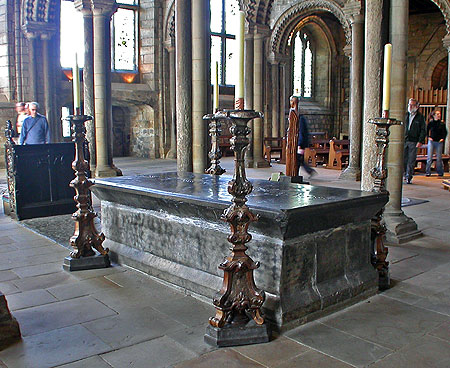
The not-at-all misty bones of the Anglo-Saxon historian, Saint Bede, are here, in Durham Cathedral.

In recent comments on Shakespeare, Lyndon LaRouche referred to the Bard's "Saxon" plays, which he described as being set in the "mystical, misty areas of pre-Norman Conquest England." In response, "eaglebeak" of the Factnet anti-LaRouche message board points out that Shakespeare never wrote any plays with a Saxon setting, and that LaRouche had "mistaken the Anglo-Saxon era for that of pre-Roman Conquest Britain" (the setting of King Lear and Cymbeline). (Read LaRouche's rant and eaglebeak's reply here.)
Eaglebeak also suggested that LaRouche's grasp of the history of the British Isles is as shaky as his grasp of Shakepeare:
[T]he centuries of Anglo-Saxon ascendancy before the Norman Conquest are by no means "mystical, misty" to modern scholars although apparently "misty" in Lyn's mind. In the Anglo-Saxon period, an extraordinary amount of history was written, from the Venerable Bede’s History of the English Church and People, c. 731 (also translated as The Ecclesiastical History of the English People) to the Anglo-Saxon Chronicle begun by King Alfred the Great in the 9th century. Not to mention St. Anselm, Archbishop of Canterbury (1033-1109), one of the Great Doctors of the Church. Or Alcuin of York (c 730/740-804), the leading scholar at Charlemagne's court. Or St. Boniface (672-754).
Let's carry eaglebeak's argument to the bitter end by enumerating the many other surviving literary works and other records of the Anglo-Saxons, both in the Old English (Anglo-Saxon) language and in Latin. These include Asser's Life of King Alfred, the religious documents emanating from Archbishop Theodore's 7th century learning center at Canterbury, numerous clerical and secular legal texts, official documents such as wills and legal trial narratives, saints' tales in prose, sermons (as those by Aelfric of Eynsham and Archbishop Wulfstan II), and sophisticated works of poetry such as Guthlac (about a 7th century English saint), Beowulf, the Lays of Boethius, Elene, The Seafarer, The Dream of the Rood, The Ruin, The Battle of Maldon and The Phoenix — the latter, my favorite in translation, is a creative adaptation of a 4th century Roman poem. (For much more, check out Wikipedia's survey of Anglo-Saxon literature here.)
Then there's the sizeable documentary record in Latin, Old French, Old Norse, etc. compiled about the Anglo-Saxons by their Continental contemporaries, and the vast number of artifacts and coins unearthed during recent centuries. And let's not forget the surviving Anglo-Saxon structures either incorporated into buildings of later centuries or free-standing (an example of the latter is the Saxon Tower in downtown Oxford that I touched with my own hand last July while strolling down the street for a secret Get-LaRouche meeting with my oligarchical masters).
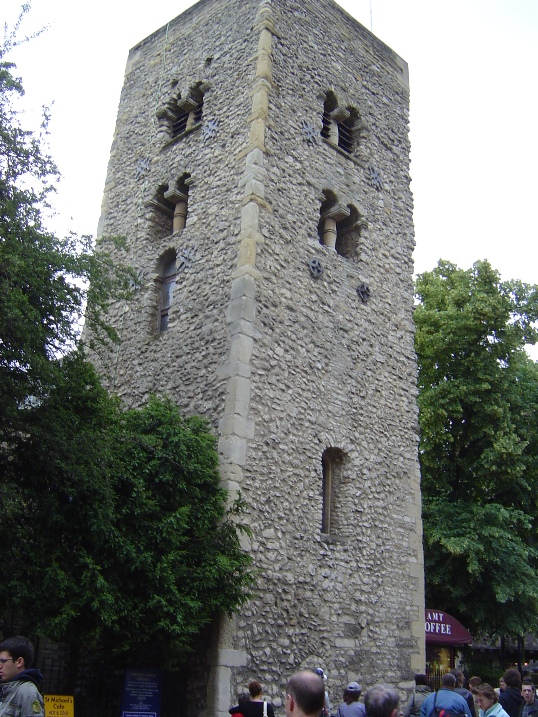
Perhaps most appalling is LaRouche's ignorance of the Domesday Book completed for King William only 20 years after the conquest. This vast compendium of information about the pre-conquest period includes 13,418 place names and detailed shire-by-shire records of land tenureship and taxes under Edward the Confessor. In my day, every high school student was taught the name of this book, the contents of which are no more "mystical" or "misty" than the land ownership and tax assessment records at any U.S. county courthouse.
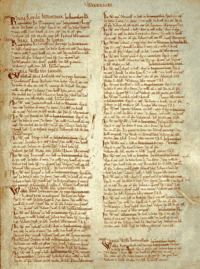
LaRouche also seems to be unaware of the extraordinary number of books and articles on Anglo-Saxon England's politics, art, literature, laws, technology, socioeconomic structure, religion and foreign relations produced by scholars since the early 1800s (cf. the electronic version of C.P. Biggam's Anglo-Saxon Studies: A Select Bibliography). In addition, LaRouche apparently is unfamiliar with Simon Keynes' An Atlas of Attestations in Anglo-Saxon Charters c. 670-1066. Nor does LaRouche appear to know about the Prosopography of Anglo-Saxon England, which strives to include "every named Anglo-Saxon who is recorded as living" between 597 C.E. and 1042 C.E. As of 2009, you can search in this database thousands of historically documented names cross-referenced by source of information, social status, location, type of event, office (e.g., sub-deacon), occupation, relationships (by type of kinship) and kinds of possessions as mentioned in the written sources.
You don't have to be a scholar to learn about such resources--I found them in five minutes on Google. I just wonder if LaRouche has ever thought of googling a historical subject before he pontificates on it. Indeed, I wonder if he has ever personally performed a Google search on any subject, even once.
Apparently the world's greatest genius is also neglecting to consult his highly educated "boomers"—the old-timers of his organization, many of whom actually went to grad school and developed expertise in various subjects before being recruited into the LaRouche movement. If he had consulted them before sounding off on the alleged obscurity of the Anglo-Saxon era, one of the less servile among them might have told him how thousands and thousands of English literature graduate students have studied the Old English language over the past century pursuant to meeting their language requirements for a Ph.D. (Many have also studied Old English because it provides direct access to a terrific body of literature that brings to life the aspirations and daily travails of a gifted people.)
Is LaRouche aware of any of the above information regarding the Anglo-Saxons and their history and literature? I know that sometimes he deliberately suppresses or distorts inconvenient information when making a dogmatic point to a gathering of his acolytes, but in the case of the Anglo-Saxons (as on so many other subjects) I think he simply doesn't know what the f*** he's talking about.
Several of his critics on Factnet and elsewhere have noted how his ignorance will often be masked by his use of dismissive and/or abusive rhetoric in describing various historical figures, nations and cultures—with the harshness of his comments serving to intimidate his listeners/readers so they won't question his own qualifications or examine too closely his absurd pronouncements. (Best known are his tirades against Sir Isaac Newton: LaRouche doesn't have the mathematical grounding to even begin to understand the Principia Mathematica but he assures us that he has proof that the founder of modern physics was a fraud and one of the most evil men of all time.)
LaRouche's intemperate language re the Anglo-Saxons—accusing them of being rotten, doomed, unfit to survive, etc.—is especially odd since King Alfred in the 9th century attempted the kind of topdown cultural renaissance and "city building" program (read here) that LaRouche professes to regard as the motor of "humanist" progress. Indeed, Alfred even tried to popularize Boethius's Consolations, which is a major expression of Christian Neo-Platonism—the very philosophy that LaRouche elsewhere praises as a kind of proto-LaRouchism.
LaRouche has an odd habit (possibly rooted in a thought disorder) of trying to "predict" past events from his standpoint in the present, as if he were simultaneously in the past himself. The Anglo-Saxons, the Danes and the Scots—he says—were all doomed, suffered doom, deserved what they got. But what the historical record reveals is very different from any of this Monday morning quarterbacking. The Norman conquerors of England assimilated into English society rather than destroying it, and ceased to regard themselves as Normans. Then, during the Wars of the Roses the Norman-descended nobility was decisively weakened, leaving a society and power structure that was more English than ever. Meanwhile the Old English tongue evolved into the Middle English of Chaucer, and then into the modern English language. The English people, far from being "doomed," launched (along with the "doomed" Scots) the industrial revolution, built a powerful empire, and joined with their North American cousins to defeat Hitler. And these same English, along the way, came to define themselves as the direct descendants of the Anglo-Saxons, while in the United States, persons of English descent came to be known (albeit perjoratively) as White Anglo-Saxon Protestants, or WASPs.
Some readers may regard the above history lesson as too elementary for inclusion here, but I'm providing it for the benefit of members of the LaRouche Youth Movement, many of them college freshmen dropouts (or even kids who were recruited straight from high school) who've been duped by LaRouchian nonsense that their prior limited educations left them powerless to challenge.
And now let's look at the historical record regarding the "doomed" Danes. The celebrated Danish warrior Canute conquered the throne of England in 1016 and ruled until 1035, restoring prosperity and briefly uniting England and Denmark (but without undermining the Anglo-Saxon culture or society) and proving himself to be a brilliant statesman. You can read a detailed account of Canute's reign (misty only to LaRouche) here.
Over the following millennium the Danes managed to staunchly maintain their national identity and their political independence. During the Napoleonic Wars, Denmark was a member of the League of Armed Neutrality—a minor alliance that LaRouche frequently cites (without knowing much about it) as a high point of the struggle of progressive humanists against reactionary oligarchs. (Thus we see once again how LaRouche contradicts his own prior assertions, apparently not remembering—or not caring about—what he had written earlier.)
The Danes subsequently participated in the industrial revolution and developed the civilized consciousness that prompted their efforts to save most of the Danish Jews from Hitler when no other occupied nation in Western Europe was willing to even try. Today, they are one of the world's most prosperous countries, participating, among other things, in massive construction projects of the sort that are supposedly dear to LaRouche's heart (e.g., the Oresund bridge-tunnel-artificial island that now connects Denmark and Sweden, and is probably the closest approximation among existing feats of engineering to LaRouche's fancied maglev tunnel under the Bering Strait).
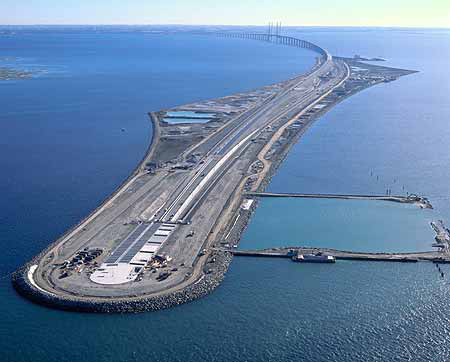
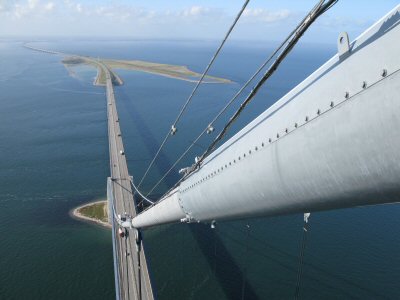
So what's with LaRouche's dislike of the various nationalities that appear in (or that he thinks appear in) Shakespeare's plays—and especially the Anglo-Saxons? I asked a former member who worked in LaRouche's national office for decades and who observed the notoriously reclusive ideologue up close on many occasions:
Well, of course, the Anglo-Saxons are the English. Now Lyn can never tell if it's the English or the British he hates. He says British because he means British Empire, but of course the English are the captains of the British Empire.
And he hates WASP culture or whatever, considers all WASPs racists[FN 1] and snobs (his mother's family excepted, I guess).
I think he hates Jews and Englishmen because both make him feel inferior, understandably.
It would appear that in the case of LaRouche the old leftist mantra from the 1960s—"the personal is political"—has been inverted: it is the political, in LaRouche's mind, that is intensely personal, albeit (in this instance) in a contradictory way, with LaRouche being torn between admiration for, and hatred of, the WASPs. On the one hand, they are the symbols of everything desirable. He has bragged in various autobiographical pieces about his mother's WASP heritage, suggesting that her ancestors came over on the Mayflower. And when he decided to pack up and flee New York in the early 1980s (thinking the Jews were out to kill him), he chose to move to Virginia fox-hunting country and establish himself on a country estate, where he proceeded to use his cult followers as servants right out of P.G. Woodhouse's Blandings Castle farces. He even started dressing like an English squire.
On the other hand, there's his deep resentment of WASPs, which I don't doubt is real. I suspect it goes back to his childhood in New England, where the LaRouche family name would have branded him as a member of the French Canadian minority, which was looked down on and was the target of stereotyping by WASPs and other white ethnic groups in the states bordering Quebec (e.g., New Hampshire, where he was born) and in the industrial towns of Massachusetts (such as Lynn, MA where he grew up). Since his father had married outside the French Canadian community and had converted from Catholicism to the Quaker faith, LaRouche would have been cut off from the rich and self-protective culture of the Massachusetts French Canadians that is depicted so vividly in some of the novels of his distant (very distant) cousin Jack Kerouac.
Ironically, when the Virginia-based LaRouche began to engage in large-scale white collar criminal activities in the 1980s, it was the U.S. Attorney for Massachusetts—an old-money WASP named William Weld (later to become governor)—who launched the investigation that led to LaRouche's indictment, conviction and imprisonment. One can sort of understand why LaRouche felt stung to the quick and began ranting against Weld and the Boston bluebloods who temporarily bumped even Henry Kissinger and the Queen of England from the top of his enemies list. LaRouche even stated (according to FBI agent Richard Egan in testimony at a 1986 bond hearing for two of LaRouche's top aides) that Weld "does not deserve to live" and that the prosecutor "should get a bullet...between the eyes."
LaRouche's childhood experiences of ethnic ambiguity and discrimination may explain some elements of his adult behavior, but are no excuse for what he has become. Lots of people suffer social isolation and mistreatment as children without becoming serial haters of WASPs, Jews, Italians, Irish, blacks, Hispanics, gays, lesbians, Episcopalians, Wiccans, Greek Orthodox monks, anthropologists and feminists—all of whom LaRouche has railed against with gusto. But it's fascinating to trace how his biliousness influences his ideological pronouncements—and especially his conspiracy theory of history, which he often uses simply as a convenient framework for his hatred du jour. This may explain why—as noted in the case of the Danes and Anglo-Saxons—he often applies his conspiracy scheme in a wildly erratic fashion (except against the Jews, whom he has reviled with monotonous consistency using an ever-expanding collection of code words).
It also may be that LaRouche—who in the depths of his mind makes little distinction between events 1,000 years ago and events today (as evidenced by those weird "predictions" about past events)—just can't forgive the descendants of the Anglo-Saxons for escaping the noose at Dunkirk and going on to defeat the heroic Wehrmacht.
But there's another motive here that I think is crystal-clear. LaRouche's cultural magazine Fidelio published an article several years ago lauding the very same Anglo-Saxon culture that LaRouche now regards as having been evil, degenerate and morally unfit to survive. And who edited that issue of Fidelio? According to the masthead, it was none other than the late Kenneth Kronberg. And who wrote the article in question? Why, bless my soul, it bears the name of the person whom LaRouche today hates and fears more than anyone on this planet, the "witch" who haunts his nightmares, the female Grendel-monster who just won't shut up...yep, you guessed it: Molly Kronberg!
--------------------------------------------------
[1] LaRouche's anti-racist posturing has always been breathtakingly hypocritical. Read here about his movement's history of racially-charged rhetoric and deeds (including a 2008 speech by LaRouche calling Barak Obama a tree-swinging monkey).
